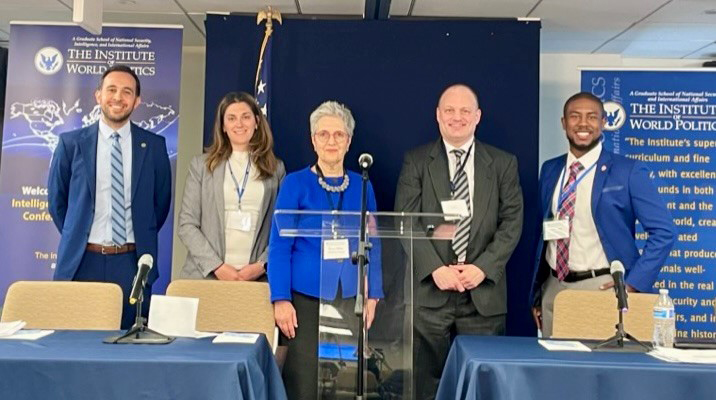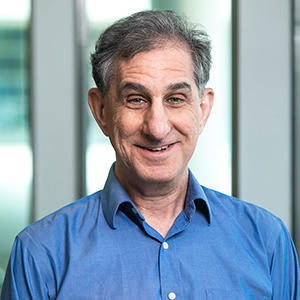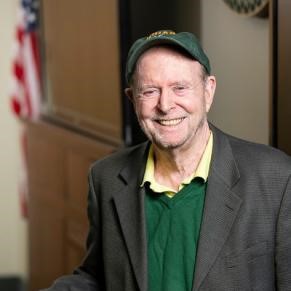In This Story

The Schar School of Policy and Government was well represented with student participants at the recent Intelligence Studies Consortium (ISC), hosted by the Institute of World Politics and held in Reston, Virginia. The ISC, founded in 2017, is a collaborative initiative that fosters communication and cooperation between academic institutions and government organizations in the field of intelligence.
The George Mason University cohort was led by Schar School professor Ellen Laipson, director of the Center of Security Policy Studies and head of the Master of International Security degree program.
- Master of Public Policy student Anthony Amos, who came to Mason after graduating from the University of Hawaii-West Oahu, participated in a panel discussion moderated by Laipson; he spoke about the challenges of regulating lithium and the state of U.S.-China competition.
- Master of Global Commerce and Policy student Abiel Alvarenga presented his findings on satellite security in a well-received poster display.
- Master of International Security student Tyler Fleming, who by day specializes in counterproliferation and weapons of mass destruction analysis, spoke about how a business concept of agility would help the intelligence community improve collaboration.
Like the other schools in the consortium, the Schar School’s proximity to decision makers and thought leaders in key positions throughout Washington, D.C., affords opportunities such as the ISC conference for students to present their work to appreciative audiences.
The school has developed a rich menu of course offerings related to intelligence, and faculty include several former intelligence community senior leaders, such as former National Security Agency and CIA director Michael V. Hayden, former Defense Intelligence Agency official James Danoy, and former CIA officer Ronald Marks.
********
Schar School professors Alan Abramson and Stefan Toepler attended a White House Roundtable on Nonprofit Workforce and Data last week.
The roundtable, which was organized by White House staff in collaboration with Independent Sector and the Aspen Institute’s Program on Philanthropy and Social Innovation, engaged participants in dialogue about the ongoing challenges facing the nonprofit workforce and the critical role that U.S. government plays in shaping and advancing policy interventions that are crucial to addressing the needs of the nonprofit workforce.
“Much of the roundtable discussion focused on how federal data sources, including information about nonprofit employment from the U.S. Bureau of Labor Statistics and nonprofit economic activity from the U.S. Bureau of Economic Analysis, can help policymakers better understand the condition of the nonprofit sector and inform their consideration of policies that can strengthen this important part of our society,” reports Abramson.
The roundtable touched on an important area of focus for the Schar School’s Center on Nonprofits, Philanthropy, and Social Enterprise, directed by Abramson. With support from the Charles Stewart Mott Foundation, the center is engaged in a major project, the George Mason University – Nonprofit Employment Data project, that analyzes federal nonprofit employment data and is developing a website to make this data available to the public and scholars in an easily accessible format.
The project is also exploring other federal data sources that contain information about nonprofits which can be helpful to policymakers, nonprofit leaders, and scholars seeking to deepen their understanding of nonprofit activities.
********

Speaking of the White House, Schar School professor of public policy David M. Hart’s groundbreaking work on clean energy policy was cited in the 2024 Economic Report of the President, an annual overview of the nation’s economic progress.
Hart’s citation in the chapter “Accelerating the Clean Energy Transition” warns that “if new technologies cannot compete with existing energy technologies, they will be unable to advance to mass production and experience the cost declines associated with scale economies and learning effects.”
The citation is from Hart’s study, “The Impact of China’s Production Surge on Innovation in the Global Solar Photovoltaics Industry.”
********

Artificial Intelligence isn’t just for younger generations. That’s why none other than the AARP, the nation’s largest nonprofit advocacy organization for those 50 years and older, is conducting a series of informational seminars called “Scam Jam.” The sessions will enlighten audiences on how AI is used to mimic voices, alter photos, and take their money.
It is entirely appropriate that longtime Schar School professor of public policy Stephen Ruth is among the invited speakers offering their insight to audiences in Virginia in the hopes of preventing AI fraud. Early registration for the series indicated hundreds will attend the sessions over the next few weeks.
Ruth, who teaches a popular elective course on AI policy and is the founding director of the Schar School’s International Center for Applied Studies in Information Technology (ICASIT), will address “Artificial Intelligence (AI): A Blessing or a Curse?” and tackle the issues and concerns the fast-growing technology offers.
Ruth, by the way, is 90 years old. He has been teaching technology policy at Mason for 46 years.
